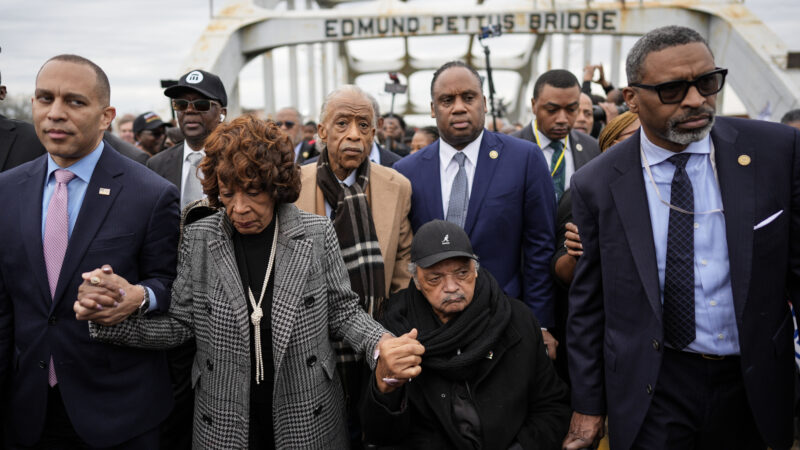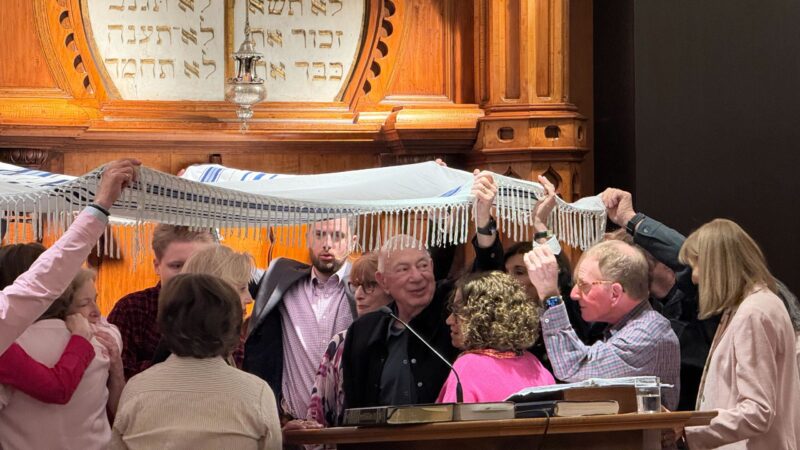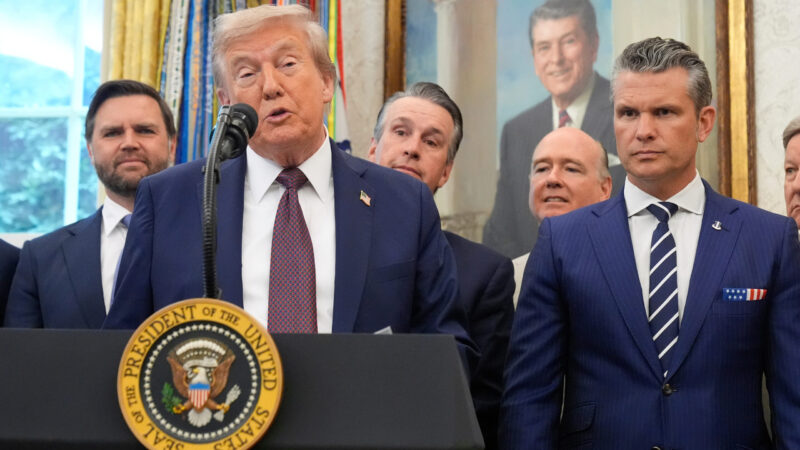‘Bloody Sunday’ 60th anniversary marked in Selma with remembrances and concerns about the future
U.S. Rep. Hakeem Jeffries, D-NY, U.S. Rep. Maxine Waters, D-Calif., Rev. Al Sharpton, Rev. Jesse Jackson and NAACP President Derick Johnson, from left, march across the Edmund Pettus bridge during the 60th anniversary of the march to ensure that African Americans could exercise their constitutional right to vote, Sunday, March 9, 2025, in Selma, Ala.
By Kim Chandler and Safiyah Riddle
SELMA, Ala. (AP) — Charles Mauldin was near the front of a line of voting rights marchers walking in pairs across the Edmund Pettus Bridge in Selma, Alabama on March 7, 1965.
The marchers were protesting white officials’ refusal to allow Black Alabamians to register to vote, as well as the killing days earlier of Jimmie Lee Jackson, a minister and voting rights organizer who was shot by a state trooper in nearby Marion.
At the apex of the span over the Alabama River, they saw what awaited them: a line of state troopers, deputies and men on horseback. They kept going. After they approached, law enforcement gave a two-minute warning to disperse and then unleashed violence.
“Within about a minute or a half, they took their billy clubs, holding it on both ends, began to push us back to back us in, and then they began to beat men, women and children, and tear gas men, women and children, and cattle prod men, women and children viciously,” said Mauldin, who was 17 at the time.
Selma on Sunday marked the 60th anniversary of the clash that became known as Bloody Sunday. The attack shocked the nation and galvanized support for the U.S. Voting Rights Act of 1965. The annual commemoration pays homage to those who fought to secure voting rights for Black Americans and brought calls to recommit to the fight for equality.
For those gathered in Selma, the celebration comes amid concerns about new voting restrictions and the Trump administration’s effort to remake federal agencies they said helped make America a democracy for all.
Speaking at the pulpit of the city’s historic Tabernacle Baptist Church, House Minority Leader Hakeem Jeffries said what happened in Selma changed the nation. He said the 60th anniversary comes at a time when there is “trouble all around” and some “want to whitewash our history.” But he said like the marchers of Bloody Sunday, they must keep going.
“At this moment, faced with trouble on every side, we’ve got to press on,” Jeffries said to the crowd that included the Rev. Jesse Jackson, multiple members of Congress and others gathered for the commemoration.
Members of Congress joined with Bloody Sunday marchers to lead a march of several thousand people across the Edmund Pettus Bridge. They stopped to pray at the site where marchers were beaten in 1965.
“We gather here on the 60th anniversary of Bloody Sunday when our country is in chaos,” said U.S. Rep. Terri Sewell of Alabama.
Sewell, a Selma native, noted the number of voting restrictions introduced since the U.S. Supreme Court effectively abolished a key part of the Voting Rights Act that required jurisdictions with a history of racial discrimination to clear new voting laws with the Justice Department. Other speakers noted the Trump administration’s push to end diversity, equity and inclusion efforts and a rollback of equal opportunity executive orders that have been on the books since the 1960s.
In 1965, the Bloody Sunday marchers led by John Lewis and Hosea Williams walked in pairs across the Selma bridge headed toward Montgomery.
“We had steeled our nerves to a point where we were so determined that we were willing to confront. It was past being courageous. We were determined, and we were indignant,” Mauldin recalled.
He said the “country was not a democracy for Black folks” until voting rights. “And we’re still constantly fighting to make that a more concrete reality for ourselves.”
Kirk Carrington was just 13 on Bloody Sunday and was chased through the city by a man on a horse wielding a stick. “When we started marching, we did not know the impact we would have in America,” he said.
Dr. Verdell Lett Dawson, who grew up in Selma, remembers a time when she was expected to lower her gaze if she passed a white person on the street to avoid making eye contact.
Dawson and Mauldin said they are concerned about the potential dismantling of the Department of Education and other changes to federal agencies.
Support from the federal government “is how Black Americans have been able to get justice, to get some semblance of equality, because left to states’ rights, it is going to be the white majority that’s going to rule,” Dawson said.
“That that’s a tragedy of 60 years later: what we are looking at now is a return to the 1950s,” Dawson said.
Auburn fires coach Hugh Freeze following 12th loss in his last 15 SEC games
The 56-year-old Freeze failed to fix Auburn’s offensive issues in three years on the Plains, scoring 24 or fewer points in 17 of his 22 league games. He also ended up on the wrong end of too many close matchups, including twice this season thanks partly to questionable calls.
In a ‘disheartening’ era, the nation’s former top mining regulator speaks out
Joe Pizarchik, who led the federal Office of Surface Mining Reclamation and Enforcement from 2009 to 2017, says Alabama’s move in the wake of a fatal 2024 home explosion increases risks to residents living atop “gassy” coal mines.
‘It’s like feeling the arms of your creator just wrapped around you’: a visit to a special healing Shabbat
Members of Temple Emanu-El in Birmingham gathered recently for their traditional Friday Shabbat service. But this particular service was different, as could be seen by all the people dressed in their finest pink.
Space Command is coming to Huntsville. What might that mean for first-time homebuyers
While Huntsville has been a more affordable market than other growing cities, what’s it been like for those looking for their first home?
Colorado says relocation of Space Command to Alabama is ‘punishment’ for mail-in voting
The litigation announced by Colorado Attorney General Phil Weiser asks a federal judge to block the move as unconstitutional.
Breaking down Alabama’s CHOOSE Act
It’s been a year since Alabama legislators passed the CHOOSE Act allowing families to apply for state funds to use towards homeschool expenses and tuition for participating private schools. The Alabama Daily News’ education reporter Trisha Powell Crain has been diving into how the funds are being used. WBHM’s Andrew Gelderman sat down with her to talk about what we’re seeing so far.









